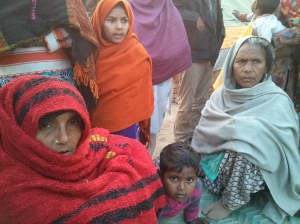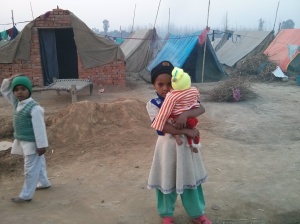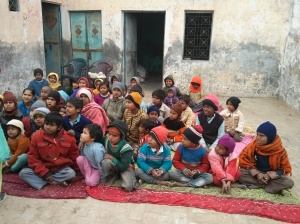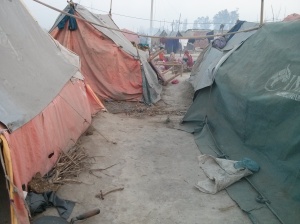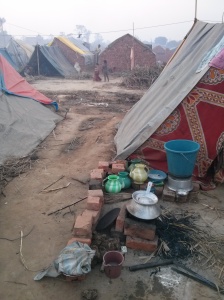Recently, I was watching a documentary on the 1984 anti-Sikh riots in India. The event has a similar impact on Sikhs as the Holocaust does on Jews. Unforgettable, life-changing and a truly defining turn for their lives. At the end of the documentary, the narrator spoke about the importance of an outwardly display of the Sikh identity is crucial. There were many happy photos of young Sikh girls in turbans and my immediate reaction was to feel a sense of connection with them. Those girls spoke of the respect and identity they found by wearing a turban.
While I understand the trajectory of this self-identity, I have no qualms in admitting that my reasons to wear the burqa/abaya/cloak are different to many and home to some. I find myself writing of this (again and again) simply because people don’t stop asking. The more bad press that Muslims get, which seems like an endless pit, the more I find myself explaining my choices to others—Muslims and non-Muslims alike.
9/11 was not simply an epicenter, but it became a starting point for this generation to trace back the discrimination towards the Muslim community globally. But the ugly morphing of ignorance, bias, discrimination, and the negative events that some Muslims have supported and been part of, is making a wider disillusionment more prominent: that of Muslims’ distrust against their own.
Last week, at a talk in London by a prominent Palestinian author, an elderly gentleman sat next to me. His first question was “Are you Arab?” and then, “Why do you wear this? Doesn’t it suffocate you? This is so backward.”
He then goes on to tell me that he is a Muslim too and is alarmed at why his sister would make the choice to cover. When I tell him a bit about myself, he nods reluctantly and is unsure of what to think about me: is she oppressed or not? If she is, why is she in this room, why does she have opinions and did she say she just cycled to this event?
During the talk, the speaker, also Muslim, wraps the blame of fundamentalist Islam in the veil and brandishes it ‘brainless and stupid’ and that the women who wear them as unproductive in society. But I am not sure if she saw the many girls wearing headscarves in that event and why did these brainless, stupid, unproductive, dormant people make way to this lecture hall, to listen to a distinguished author? Sounds pretty opposite to what dormant people do (or do not do!), don’t you think?
My own ‘veil’ story started as a way to tick-mark the cultural checklist imposed on my community. Bearing the burden of Muslim conservatism in a rural Indian context, plus the problem of being a woman in India, the burqa was a normative point of entering adulthood. In our community, the ‘burqa’ is the full body cloak + the headscarf + the face-veil but it is also called the same without the face-veil, which I do not wear. Yet, despite living in the Middle East, it was a practice I could not argue against because as a community, we carried our ‘traditional’ values with us. How much of that tradition was woven within religion, you can never quite tell.
After accepting the burqa grudgingly, I increasingly found myself alienated as that uncool person who covers herself and then, post-9/11, I unknowingly became the symbol of everything wrong with the world. In moment of such crises, I found myself befriending this piece of cloth, feeling strongly against people who were demonizing a Muslim woman’s identity because she chose to wear extra fabric. I felt strongly about it and gradually, instead of that notion that the burqa will ‘protect’ me, I have found myself becoming the protector of the burqa.
So, where do I stand?
I am not a fan of ‘converting’ people into a burqa-wearing army. I am also not against people who choose to wear one, even the niqab, although I’m not a big fan of it. The burqa has taught me many lessons and continues to do so. I usually find myself to be the only person at some events, talks and conferences in a burqa and I often find myself side-lined at these events because of what I wear or, if I am speaking at these events, I am inundated with polite ‘Omg, you are human and you have a sense of humour’ comments after my talk. It is easy for everyone to be open-minded and friendly as long as you are like them, but it is entertaining to see people respond to the stereotypes that bury within them. It is this discrimination that I have a problem with. When I attend these events and break the stereotype that people have towards veiled women, this is my reason, this is my rebellion.
With ISIS and all the news and propaganda around it, it is only making it difficult to sport a Muslim identity. Someday, when I want to, I will stop wearing it. Maybe I won’t. Either way, it will not be anyone else’s decision but mine. I am not the only one, there are many like me. There are girls who wear this for religious reasons and there are ones like me who wear it for rebellious reasons. One group might not agree with the other but we deserve the space to exist as Muslim women. Nobody can take that away from us.
It is becoming increasingly common to find myself in conversations with other Muslims who are questioning their place in the Islamic public sphere, forced to choose between polarized identities; none that they could identity with. A radical liberal or a radical conservative?
While it is a good point to start asking and questioning who are the Muslim leaders who speak for the community and why do media make them their go-to contact and not others, it is futile to entertain this conversation. What is more important is to argue not for who speaks but for the creation of a space where all views are welcomed. We need to create a space for multiple views to co-exist so that this dystopian notion of a monolith of Islam is permanently shattered.
